Thanks for your support! If you make a purchase using our links in this article, we may make a commission. And, as an Amazon Associate, I earn from qualifying purchases. See the full disclosure here.
Updated April 11, 2024
With how expensive it is to buy a house these days, many people are asking the question: can I live in an RV on my own property?
The answer: it really depends on your location, your property, local laws, and more.
I enjoyed legally having an RV parked on a piece of property that our family owned for years. It was an excellent place for fishing and hiking, and we thoroughly enjoyed it. And, it didn’t cost anything for our RV to be parked there year-round.
But what exactly are the zoning laws and logistics about living in an RV on your own property?
Sure, it’s your property and you ought to have the freedom to do what you want with it.
But is it legal to live in an RV on your property? There are many things to consider to ensure you can live in an RV on your property.
First, you must ensure your land is locally zoned for an RV. You also need to make sure you have access to the right utility hookups. It’s also essential to maintain positive relationships with your neighbors, the Homeowners Association, and everyone else who may be impacted by your RV.
But how do you achieve all of this? We’ll answer these questions and more for you below. That way, you can decide for yourself whether RV living on your property is right for you.
Can I Live in an RV on my Own Property?
Yes, you can live in an RV on your own property–as long as your local government codes and HOA allow it.
Living in an RV on your own land or property is a great way to downsize and save money, but unfortunately, it’s not allowed everywhere.
Before deciding to live in an RV on your own property, you’ll need to do some research.
Is it Legal to Live in an RV On Your Own Property?
In some places, living in an RV on your own property is perfectly legal. However, certain towns, cities, and counties have laws or ordinances that ban RV living. Some areas have minimum square foot requirements, and some HOAs don’t allow RV parking.
Even though you own the property, the fact of the matter is that you must adhere to specific zoning rules and regulations regarding how you use your land. This includes whether or not you can stay in an RV or camper on your property.
If you’re within certain city limits, it’s pretty likely you won’t be able to do so. Rural areas are much more likely to allow you to live in an RV on your property. If you want to be confident you’re complying with your local laws, take these steps:
How to Find Out if You Can Live in an RV On Your Own Land
Here’s how to find out if you can live in an RV on your own land.
1. Check State, County, and City and Ordinances
First, check the state laws where you live. Is there anything saying you can’t live in your RV on your property?
If all is clear on the state level, then check the county and local ordinances. Does your county have any laws against it? What about your town? If you live within a city limit, it may be illegal to live on your deeded lot, but it’s always worth a shot to check.
2. Check for Permitting and Zoning Requirements (If Applicable)
Should your land pass all these steps, you’ll need to determine if your property is zoned for recreational use and RV living. If it is, find out if you need to get a permit, because that’s one step you won’t want to forget.
Zoning requirements for RV living control everything from neighborly issues to sanitation. Sometimes it’s difficult to understand the county regulations regarding housing.
The rules regarding housing are often clumped together, so it might be hard to figure out which rules apply specifically to RVs.
If you need help, ask for help from one of the zoning employees at your county government office. I have found them to be very helpful with all sorts of zoning and permitting questions.
3. Find Out if You Need Septic, City Sewer, And/Or a Well
While you are checking your local ordinances, contact your local public health department to find out what kind of sanitation your RV needs.
You should be okay here if your property already has water and sewer. Otherwise, find out if you need to install a septic tank and a well or hook up to city sewer.
Figuring out whether or not you can live in your RV on your property might be a bit more complicated than you imagined. But it doesn’t mean “game over” for you and your RV lifestyle. As a responsible recreation enthusiast, it’s up to you to do your due diligence. That way, if someone tries to shut you down, you’ve got the law on your side!
One final step you can take is to hire a real estate attorney to help you sort everything out.
Am I Considered Homeless If I Live In An RV?
Living in an RV has become a popular lifestyle choice for many people. Some do it for adventure and freedom, while others see it as a more affordable way of living.
However, this unconventional living arrangement raises questions about legalities and definitions, such as whether living in an RV makes one homeless.
First, it’s essential to clarify what homelessness means.
According to the U.S. Department of Housing and Urban Development (HUD), a person is homeless if they lack a fixed, regular, and adequate nighttime residence. People experiencing homelessness may live on the streets, in shelters, or in temporary housing.
So, where does living in an RV fit into this definition?
According to the Escapees RV Club, which provides domicile and residency options, full-time nomads often face unique legal challenges based on their lifestyle.
As a result, many choose to establish a “home base” in a particular state, even if they don’t physically live there year-round. This process allows individuals to maintain their legal residency and get necessary documents such as driver’s licenses and vehicle registrations.
But what about those who don’t have a home base or permanent address?
Sometimes, living in an RV can cause being classified as “unsheltered” rather than homeless.
An RV provides shelter, which is why it is considered a fixed residence, even though it is mobile.
However, this classification may vary depending on local laws and regulations.
Can I Use my RV As a Guest House, AirBnb, or VRBO on my Own Property?
In some circumstances, you might want to use your RV as a guest house or vacation rental while parked on your own property.
For the most part, there are no permits required to do this on your own property. You will need to check with your local laws and ordinances, as well as with your HOA.
If you are renting out your RV on a site like Airbnb or VRBO, you may need to adhere to additional rules to keep your guests safe.
For more information, see our article on Renting Out an RV on Your Own Property here.
Can I Start An RV Park On My Property?
One of the challenges RV travelers face is finding a place to park and stay for an extended period.
With this in mind, some property owners may consider opening an RV park on their land to generate income and cater to this growing demographic.
However, starting an RV park on your property comes with its own set of challenges and considerations.
- Zoning Regulations: Check local zoning laws and regulations to ensure that operating an RV park is allowed on your property.
- Infrastructure Requirements: Building an RV park requires adequate utility hookups, such as water, electricity, and sewer connections.
- Permits and Licenses: Obtain the necessary permits and licenses to operate an RV park legally.
- Maintenance and Upkeep: Regular maintenance of RV park facilities and grounds is essential to ensure a pleasant experience for guests.
- Marketing and Promotion: Developing a marketing strategy to attract RV travelers to your park is crucial for success.
- Safety and Security: Implement security measures to ensure the safety of guests and their belongings while staying at the RV park.
- Financial Considerations: Calculate the initial investment costs, ongoing expenses, and potential revenue streams to determine the economic viability of operating an RV park.
Overall, running an RV park requires a mix of marketing skills, management abilities, and a passion for providing an enjoyable experience for guests.
An RV park can be a successful and fulfilling business venture with proper planning and organization.
Hooking Your RV Up to Your Utilities
Whether or not you can live on your property in your RV is more than just a legal matter. It’s a matter of logistics health and safety, too. Local or state safety and health regulations may require you to hook up to utilities on your land.
After all, you can’t live in an RV without water, sewer, or power—otherwise, you’d just be camping!
The next step is to determine whether your property has the utilities you and your RV will need should you decide to live there. Here’s a list of questions you can use to determine whether the property has the proper utilities to support an RV.
Whether you already own your land or are on the hunt for a property that’s right for your prospective lifestyle, you’ll need the answers to these questions.
Considerations For Your Property
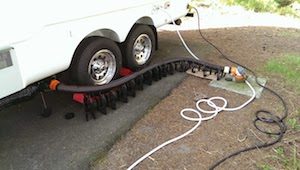 Is there access to potable water on the land?
Is there access to potable water on the land?- Does the ground support a septic system?
- Are public water and sewer connections available on the property?
- Can the ground be cleared and leveled for proper parking and utility hookup if need be?
- Is there road frontage?
- Will you need a permit for a driveway apron to access the property?
- What about access to electricity?
- Will you have access to phone and or internet service?
Finding an affordable, accessible, and enjoyable piece of RV-friendly property may take some time. However, if you’re determined to live in your RV, it’s worth it in the end.
Keep in mind that just because you have access to hooking utilities doesn’t mean you can live in your RV. Sometimes, zoning and permit regulations are in place to ensure you are living in a safe, clean, and neat manner. After all, RV living ought to be suitable for you and the folks who live around you.
Can I Use a Regular Extension Cord For Electricity When Living In My RV?
No. You should never rely on an extension cord for electricity to your RV. RVs need a lot more power than a regular extension cord can handle–this would be a major fire hazard.
Not only is it a fire hazard, it’s very likely that your area has specific rules and regulations for safe electricity.
Living in an RV On Your Own Property and Homeowners Associations
Homeowners Associations, also known as HOAs, have many rules intended to preserve a community’s value. Therefore, some HOAs have restrictions against RVs parked on private property within the community.
Of course, your own HOA decision about whether or not you can live in your RV on the front, side, or back of your property depends on the community itself.
One of the primary considerations includes the class of RV. There are three main classes, as well as travel trailers and fifth wheels.
Types of RVs
Class A recreational vehicles loosely match the measurements of a charter bus. They are often 35 feet in length or more. These RVs are the largest and, quite frankly, the most likely to be denied. Some reasons may be that they obstruct views or fail to fit snugly in a single driveway.
Class B recreational vehicles look more like a vans. Depending on height, these may not fit in a garage, but a driveway is a safe bet.
Class C recreational vehicles range in size from 18 to 35 feet. The size of your driveway or lawn determines whether you can fit one on your property.
Travel trailers tow behind a vehicle or truck. Their size can vary significantly, from 20 feet long to over 40 feet long. If you’re looking to live in your RV in an HOA-managed community, it’s best to pick a vehicle that fits (quite literally) on your land nicely. In places such as these, your neighbors’ opinions matter more than you may realize.
Fifth-wheel RVs are the largest type of towable camper. They also feel the most residential and are very popular with people who want to try full-time RV living. However, since fifth wheels are very large, they might not be allowed in certain places.
Being Neighborly While Living in an RV On Your Own Property
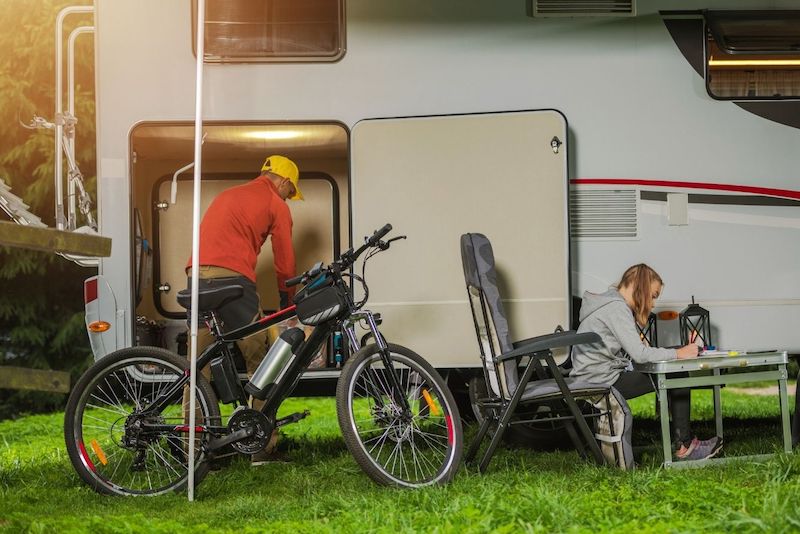
Some people choose a lifestyle that keeps them in contact with others; it feeds their need for socialization. Other people strategically elect a manner of living that puts them out of touch with others. They like the piece of quiet that accompanies a remote environment. Wherever you fall on the spectrum, there’s one thing that’s important to remember. Other people living in this world can’t always appreciate our way of life. That’s why, if you wish to maintain your recreational vehicle existence, it’s crucial to remain neighborly.
If you plan on living in an RV, it’s always best to let your next-door neighbors know ahead of time. This way you can discuss any of their concerns before you spend money to clear or level a spot only to find out you’re blocking your neighbor’s view. Any issues that arise regarding your RV living are best when dealt with firsthand.
It’s always best, in my opinion, to be friendly and talk to your neighbor about your plans ahead of time. If there’s one thing we’ve learned, what’s most important is going after the life we love to lead. For the RVer in you, this means keeping the neighbors pleased, too. In our book, whatever it takes to wake up in an RV every day is well worth the effort.
Other Considerations if You Are Looking for Land to Live in Your RV Full-Time
If you are looking to purchase land to live in your RV, there are quite a few things to consider first.
1. Zoning and Permitting Requirements – as we discussed start here and see if the land even allows RVs.
2. Power, Water, and Sewer—It can be very costly to add a well, septic field and electricity to your property. Instead of a septic field, you might be able to install a septic tank that will need to be pumped out periodically. And instead of electricity, you may be able to install solar power. But all of these options cost serious money.
3. Phone and Cable – You may or may not want phone and cable but if you do are they accessible? If not, can you at least get a cell signal?
4. Location, Location, Location – Is the land convenient to grocery stores, shopping, or work? Is it safe? Is it quiet? What other development could be in the planning stage in the area around the property? Every property has its pros and cons but it would be terrible to find the perfect property only to discover that a shopping center or shooting range will be built near the property where you want to live.
5. Clearing and Grading – how much will it cost to clear and level the land where you want to park your RV?
6. Access – Will you be required to (or have to) build an access road to your parking location? Some counties even require a permit to install a driveway apron which is the concrete that slopes up from the road to the beginning of your driveway.
7. Prepare for Changing Seasons – Not all RVs are 4-season friendly. And even the ones that are may need a little extra insulation in the cold months!
RV skirting can help keep your RV warm and pest-free in the winter. And if you know you’ll be living in an RV in very cold or hot temps, you can just get a four-season camper from the beginning to be better prepared.
Benefits Of Living In An RV On Your Own Property
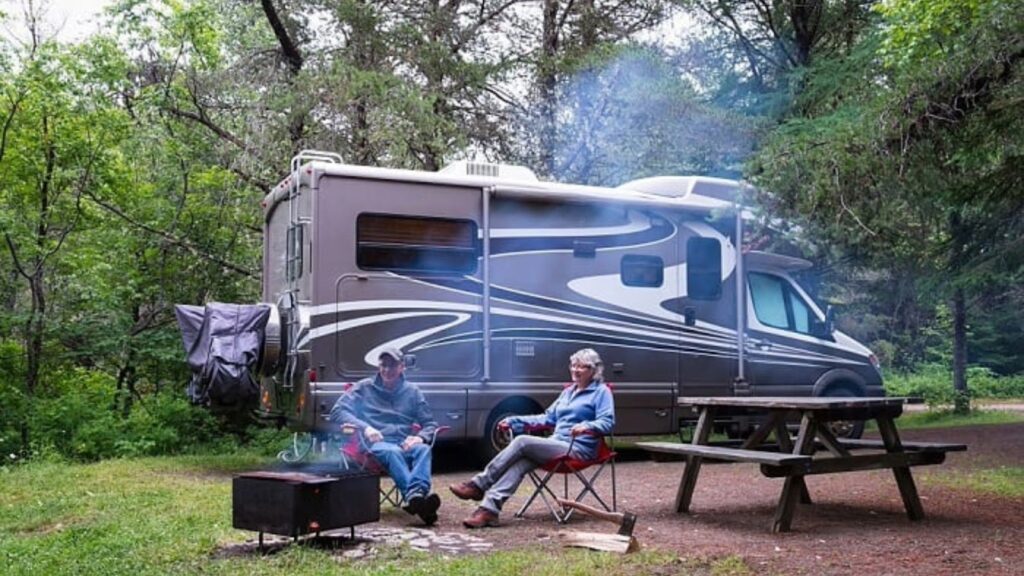
Living in an RV on your own property has become popular among those seeking a simpler, more affordable lifestyle.
Living in an RV on your property can offer many benefits, whether you’re looking to downsize, save money on rent or mortgage expenses, or embrace a more minimalist lifestyle.
1. Cost Savings
One of the main reasons people choose to live in an RV on their own property is the cost savings. You can save significantly on rent or mortgage payments by eliminating the need for a traditional house or apartment.
2. Flexibility and Freedom
Living in an RV allows for flexibility and freedom that traditional housing cannot offer. Since the RV is personal property, you can move it anytime. Not having to sell or rent out a home makes moving or traveling to a different location easier. It also means if you change your living situation, you can easily do so without being tied down by a mortgage.
3. Minimal Maintenance
Maintaining an RV is much simpler compared to maintaining a traditional house. With less square footage and often fewer amenities, fewer things need upkeep, saving time and reducing maintenance costs.
4. Eco-Friendly Living
Living in an RV usually means using less energy and resources than a traditional home. RVs are self-sufficient with solar panels, water tanks, and greywater systems. Living in an RV can reduce your carbon footprint and help you live more sustainably.
5. Freedom to Travel
One of the most significant advantages of living in an RV is the freedom to travel whenever and wherever you want. You can easily pack up and move on to your next destination without worrying about booking flights or accommodation. When you have the freedom to explore new places at your own pace, it allows for spontaneous adventures.
6. Community Opportunities
Living in an RV also opens up opportunities for community building. There are many RV parks and communities where like-minded individuals gather, creating a sense of camaraderie and friendship. These communities often organize events, activities, and support systems for their members.
7. Affordability
Compared to traditional housing options, RV living can be much more affordable. You save on rent or mortgage, as well as on utilities and maintenance costs. With proper budgeting and planning, living in an RV can be a cost-effective way to enjoy life on the road.
8. Minimalism
Living in a small space requires you to downsize and prioritize your possessions. Adopting a more minimalistic lifestyle can help you appreciate what truly matters and let go of excess clutter. It can also teach you valuable lessons about being resourceful and creative with limited space.
9. Sustainability
RV living is often associated with sustainability and eco-friendliness. Many RVers use solar panels for electricity, conserve water, and practice responsible waste disposal methods. Living off-grid can also help reduce one’s carbon footprint and leave a smaller impact on the environment.
Final Words About Living In An RV On Your Property
Living in your RV on your own property can be a very inexpensive and practical lifestyle for you and your family. We hope this article can give you a starting point to help you make the best decision regarding living in an RV on your own property.
Related Reading:
– Can I Park an RV in My Driveway?.
– How to Install RV Hookups at Home
– Harvest Hosts – A Great Way to Camp for Free!
– How To Find Free RV Camping
Do you have any advice about living in an RV on your own property? Please leave your comments below, or feel free to email us through our Contact Page.
Mike Scarpignato – Bio
Mike Scarpignato created RVBlogger.com over five years ago in 2018 to share all we have learned about RV camping.
Mike is an avid outdoorsman with decades of experience tent camping and traveling in his 2008 Gulf Stream Conquest Class C RV and 2021 Thor Challenger Class A motorhome.
We attend RV Shows and visit RV dealerships all across the country to tour and review drivable motorhomes and towable trailers to provide the best evaluations of these RVs in our blog articles and YouTube videos.
We are 3/4-time RVers who created RVBlogger.com to provide helpful information about all kinds of RVs and related products, gear, camping memberships, tips, hacks and advice.
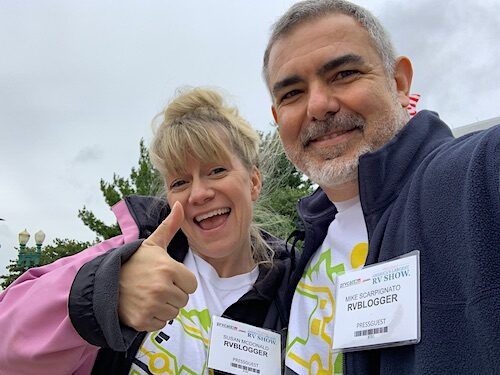

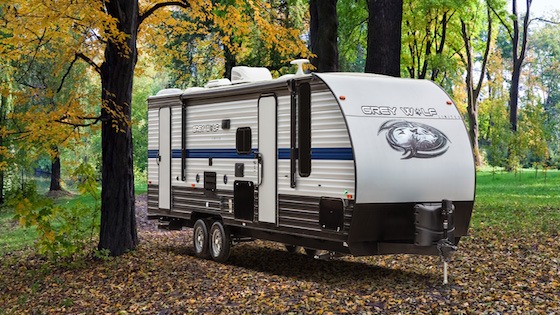
I was looking at starting a tiny home community of RV’s and tiny homes on wheels (campervans, skoolies, converted trucks) on some rural property my family owns in PA. It’s way off-grid and away from homes, stores, etc. I’m not having much luck finding out if it’s OK to do it in the area. I had a surveyor check it out and he says I could definitely put a well and septic tank there. I’ll be using solar for power. Do you think I should just go for it?
Dear Sally,
What Cindy said.
If it’s safe, you have support, and both of you are comfortable; by all means, stay where you are. I took care of my parents (who both have dementia) for as long as I could, and it would have been much easier in a smaller space. I have a chronic pain condition and DREAM of living in a tiny home.
Hi my daughter believes our RV is unsafe to live in. We are hooked up to all the amenities of a home and my husband has Cancer and prefers the RV.
She thinks not and he gets dementia
I own the RV not sure what to do ?
Hi Sally,
That sounds like a tough situation. I’m no expert on dementia but my uncle has it too. He’s not safe to live alone at home or in an RV. Someone needs to be with him pretty much all the time. It’s sad to see someone go through this. I honestly don’t know what you should do. I know when I was dealing with this issue with my uncle I did what I thought was best for his overall quality of life and safety. My heart goes out to you and your family.
Mike
Dearest Sally, my son and I lived in my 32’ RV during his battle with cancer. We were very comfortable! The upkeep was minimal allowing me the time to care for him. The key here is what you said; ‘your husband prefers it”! Folks with dementia don’t adapt to change! My son passed away last July at the age of 39, but I plan on living my remaining days in my RV home!! God bless and strengthen you !
Hello,
I don’t actually live in the USA, but I still think this is a good article for everyone around the world. I have already seen many videos about living in an RV, many of them live or grid. If there is no electricity on your property, you might be able to install solar panels. I would also check this within the place of residence, because perhaps there are also rules for that. When there is no water present, is there perhaps another way or water available?
Thank you for this great article.
Hi Astrid,
Thanks for reading the article. If there is no water available you could install a well on the property. Where I live the water table is about 200 feet deep so the cost of installing a well is expensive. Other than that I’m not sure what the best way to find water would be. This is why it’s good to have a well installed BEFORE you buy a piece of land. Or you should at least know that other properties around your land have active wells.
Thanks,
Mike
Rain collection, if it’s legal in the area